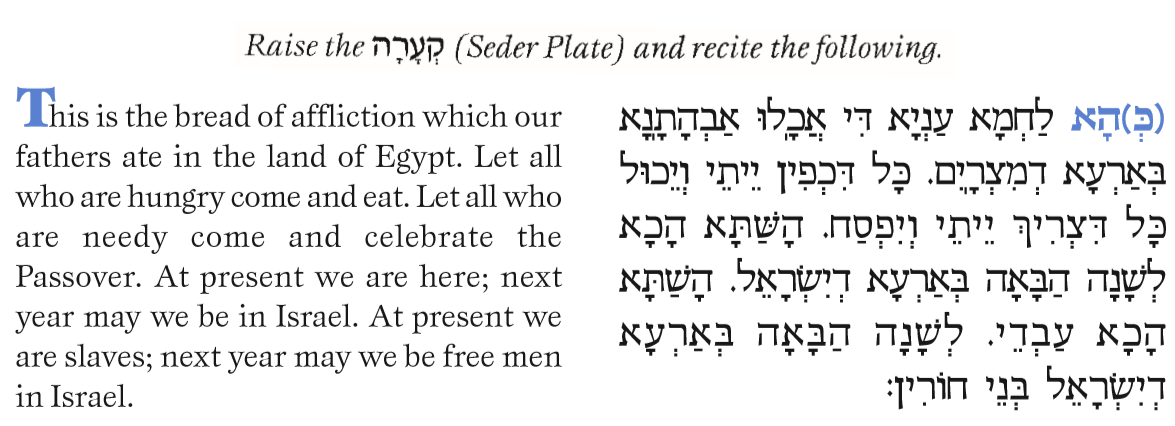Chapter 23: Ha' Lachma anya
 The Festival of Glory, The Festival of Humility
The Festival of Glory, The Festival of Humility
הא לחמא עניא
Why is it necessary for us to remember the “Lehem Oni” – the “Poor Man’s Bread”? This festival of freedom has been given two different names: “Hag HaPesah” (referring to Hashem’s having spared Bnei Yisrael when He inflicted the Plague of the Firstborn against the Egyptians) and “Hag HaMatzot.” The relationship between the two names can be understood through the following parable: A king once embarked on a hunt with several of his servants and encountered a young shepherd boy. While he tended his flock, the boy played his flute with remarkable skill and grace. The king and his men were overwhelmed by the beauty of the boy’s music and proceeded to engage him in conversation. Before long, they realized that the youngster possessed unusual intellectual gifts. The king was so impressed that he invited the shepherd to his palace. He trained the youngster in the skills of the monarchy. Quickly, the former shepherd climbed up the political ladder, until the king eventually appointed him as the kingdom’s treasurer. The new officer earned the respect and adoration of the nation’s subjects as he gradually abolished taxes and lightened the financial burdens of the common-folk. However, his success and popularity aroused the jealousy of the other political officials. They falsely accused the treasurer of having stolen huge sums of money from the royal treasury. The king, upon hearing the allegations, called an emergency cabinet meeting, where the treasurer was to present a detailed account of all transactions affecting the royal treasury which passed through his hands, as well as his own private financial dealings. Although the treasurer convincingly demonstrated that the entire treasury was intact and that the accusations were baseless, the minister of the judiciary, a personal foe and archrival, insisted that the treasurer’s house be thoroughly searched so that his claims be substantiated. The royal search team, accompanied by the king himself, arrived at the house to find a modestly furnished residence, and none of the allegedly stolen goods were to be found anywhere. The officers noticed, however, one room which remained locked throughout the entire search. No one entered or exited, and no activity seemed to take place in this one particular chamber. They approached the door, and the treasurer pleaded with the king not to allow them to enter his private cubicle. Despite his petitioning, the king ordered his officers to enter the room. They opened the door, confident that here they would find the hidden fortune. Instead, all they saw were the man’s staff, cloak and flute, his memorabilia from his forgone days as a shepherd. The royal entourage exchanged glances of utter confusion. The king turned to the former shepherd and asked, “What is this all about?” The treasurer explained, “Since the day you took me from the pastures and bestowed upon me all this great honor, I promised myself not to let this new situation allow me to become arrogant. Each day, I come into this room and spend a few private moments, playing my flute, recalling my past and reflecting upon my previous, simple life as a poor shepherd boy. My newfound fortune came unexpectedly and undeservingly; only through the kindness of the Almighty was I taken from the fields to rise to the level of the royal treasurer.” Upon hearing his treasurer’s words, the king warmly embraced him and exclaimed, “Indeed, my dear treasurer, you are most worthy of this honor which we have bestowed upon you.” Even his competitors offered him their warm handshakes, apologizing for having suspected him wrongly, and lauding him for his humility and integrity. These two concurrent experiences of the Jewish People – prestige and grandeur on the one hand, humility and submission on the other – are reflected in the two names of this festival. “Hag HaPesah” refers to the awesome miracles which we were privileged to experience – the supernatural intervention of the Almighty on our behalf as He eliminated the Egyptian firstborn and spared those of our people. However, in order to ensure that we don’t lose sight of our humble beginnings, and never allow our distinction to lead to arrogance, we relate to this occasion also as “Hag HaMatzot.” The matzot symbolize our years of bitter affliction and oppression. Our ongoing reference to our earlier years of suffering serves to maintain our sense of humility, even in the aftermath of our triumphant redemption. [Many commentaries have noted that the matzah symbolizes humility, whereas hametz and the yeast, which causes the dough to rise, represent arrogance. For this reason, the Torah prohibits the offering of hametz on the altar as part of a sacrifice, as the Almighty cannot reside in the same world as an arrogant person.] Indeed, only the humble of spirit achieve honor and prestige. (Haggadah Hazon Ovadiah)

